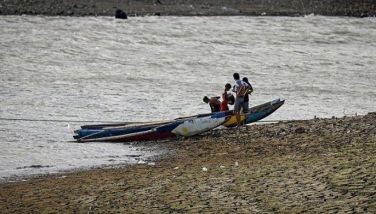‘No unified Asean stand vs China’s reclamation in SCS’
NEW DELHI – It would be no surprise if the Philippines and nine other member states of the Association of Southeast Asian Nations clam up on the issue of the maritime dispute with China during the weeklong ASEAN Ministerial Meeting set to start tomorrow in Manila.
In the two-day Delhi Dialogue, a regional forum hosted by the Indian government last July 4 to 5, international policy experts from Southeast Asia admitted it would be “really hard” if not impossible for ASEAN member-countries to come up with a unified stand against China’s massive reclamation works in the South China Sea, a mineral and oil-rich territory being claimed almost in its entirety by China.
Nguyen Thai Yen Huong, vice president and senior research fellow of the Diplomatic Academy of Vietnam, admitted that ASEAN member-countries, even the richest ones like Singapore and Brunei, depend heavily on China in terms of trade and economic support, thus it would be unwise to make any move that would potentially strain economic relations.
“We think that South China Sea is an issue that separates ASEAN... Because in the 21st century, economic cooperation becomes an item of concern among the ASEAN. Even we know that to some extent all the ASEAN countries deeply, I want to say, depend on China on trade relations,” Huong said.
China remains to be the largest trading partner of ASEAN since 2009.
In the Philippines, China has been the second largest trading partner with $17 billion in total trade in 2016, next to Japan.
Huong said the need to protect trade relations with China becomes more significant amid the US government’s recent announcement that it is withdrawing from the Trans-Pacific Partnership (TPP) Agreement, a trade deal with Asia pushed forward by former US president Barrack Obama.
Vietnam, Malaysia, Brunei and Taiwan, aside from China and the Philippines, also have overlapping claims over the SCS.
Economic gains
Bunn Nagara, a senior fellow at the Institute of Strategic and International Studies in Malaysia, echoed the same view.
Nagara said China’s non-interference with the politics and internal policies of each ASEAN member-state coupled with the massive investments it is pouring in the region, especially on infrastructure, makes it hard for ASEAN to make a unified stand against its “older brother.”
“If you look at reality, there is no unity of stand among ASEAN countries... Politically, China lets these sovereign states in peace, it does not interfere with their politics,” Nagara said when asked by the audience on why ASEAN cannot be more assertive on the issue of the South China Sea.
“Secondly, economic gains. There was continued economic gains and benefits by these countries. China has become like a regional older brother to ASEAN countries,” he added.
Nagara, however, said the good relations between ASEAN and China are now getting tested because of China’s aggressive claims in the South China Sea.
“The assertions of China have been the serious mistake of (President) Xi Jinping,” Nagara said.
Duterte’s smart move
Nagara said that amid criticisms, it was a “pragmatic and smart” move on Duterte’s part to set aside the United Nations arbitral tribunal’s ruling invalidating China’s claim over most of the disputed sea.
“Mr. Duterte is not a fool as some people assume he is. He is relatively pragmatic and smart, actually. The ruling of the Permanent Court of Arbitration, the ruling against China, could not be taken any further because China refused to participate in the negotiations and even president Aquino, before, knew that,” Nagara said.
President Duterte had been repeatedly saying that he is willing to set aside the tribunal’s ruling in order to repair the relationship with China as the Philippines cannot afford to go to war. He, however, promised that the South China Sea dispute would be tackled “sooner or later.”
Anak Agung Banyu Perwita, a professor of the School of International Relations at the President University in Indonesia, likewise commended Duterte’s move, saying that it helped ease tension in the region as well as secured for the Philippines several investments.
“In the previous administration, Philippines has a very sharp, negative perception toward China. But now, under Duterte, it’s becoming more positive and accommodating,” Banyu said.
The Philippines secured around $24 billion worth of loans and investments from China last year during Duterte’s first state visit there, $15 billion of which involved company-to-company deals.
Recently, China also pledged to build additional drug rehabilitation centers in the country and aid in the rehabilitation of the war-torn Marawi City.
The two countries are also in talks on possible joint maritime exploration in the South China Sea.
COC framework
Meanwhile, in an interview with The STAR on the sidelines of the Delhi Dialogue, Ambassador Elizabeth Buensuceso, the Philippines’ permanent representative to the ASEAN, said the most the organization can do during the Ministerial Meeting is to release a framework on the Code of Conduct (COC) in the disputed sea.
“We are going to issue the framework to the Code. We finished it already... And for the next few months after we issue it, we need to give flesh to each of the chapter we have identified,” Buensuceso said.
- Latest
- Trending




























